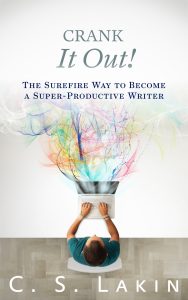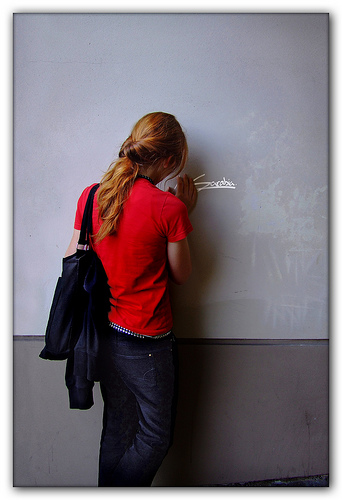Getting to the Core of Your Distractions
We took a look at distractions a bit in some earlier posts, but I want to dig deeper into this topic (hence the photo of the cute rodent in the snow). We all know what things distract us during the day and what our “weaknesses” are. Some of us just can’t stay off social media or check our phones for messages or emails every five minutes. Others get partway through writing a page and notice the floor needs sweeping or the dirty dishes are sitting in the sink.
One prolific best-selling suspense writer I know says she will find every and any reason not to write. She’ll be on her hands and knees scrubbing the stain out of her carpet instead of working on her scene. She looks for excuses not to write.
That’s not because she hates writing. It’s because writing novels is hard! It takes intense focus and concentration, and the effort is often mentally exhausting. And again, if we’re pushing ourselves to write difficult scenes because of a deadline (self-imposed or no) and/or we’re trying to be productive during a low time biologically, we are going to be more easily distracted.
It takes a lot of discipline to stick your butt in your chair, stay there, and be focused so you can crank out those scenes.
This is one reason I go to the library to write many of my novels’ scenes. I love my house—I’m in the woods on a creek and have a big porch with a table that looks out over the beautiful scenery. You’d think I would write here all the time.
I often do, but when I really need to eliminate as many distractions as possible, I leave. Because the floor does need sweeping, the dishes need washing, and the dog needs to play ball (like, every hour).
So putting yourself in a place where the distractions are limited is a great help.
And understanding why you get distracted is half the battle.
The Why of Distraction
Studies show that in the office, nearly 50% of US employees say they work for only fifteen minutes before getting distracted, and 53% report that they waste an hour or more each day due to disruptions.
These distractions can vary from noise to heavy workload and deadline pressure to feeling fatigued (maybe not enough REM sleep, right?). And some studies have found that men have a harder time than women when it comes to focusing and are more inclined to suffer from wandering attention spans (surprised?).
Our brain structure may be to blame for some of this wandering. The prefrontal cortex of the brain regulates attention span and handles our emotions. So the rise of strong emotions (frustration, anger, annoyance) can cause us to be distracted from concentration.
Our brain tries to be of help when it starts to wander. It’ll even attempt to “rewrite” the speech of boring people to keep us from losing focus, to help us pay attention.
The first step in all this is to zoom in and pinpoint the particular problem that is causing the distraction in a given instance.
If we’re distracted because of a strong emotion, we may need to deal with the situation causing the emotion before we can hunker down and write. Even if it means yelling in the closet for ten minutes, then shelving the emotion temporarily. We all have problems that crop up in life that cause emotional distress and that aren’t easily resolved. That’s life.
Big Tasks Are Daunting
In fact, they can be so daunting they freeze us up. I think that’s what most writer’s block is about. The blank screen isn’t just one blank page to us; it represents the whole darn book we’re trying to write. We’re staring at an elephant and not a mouse, and that elephant is just too big to take in.
Solution? Break up the task, even if just in your mind, into smaller tasks. That’s why I set about writing one scene a day. I can do one scene. I’ve written one scene in a day plenty of times. It’s a doable task for me. If I sit down and think about how many more scenes I need to write before I’m done, I may not start.
That’s why I love putting my scenes on index cards. I sit down at my computer to write, pull the top card out of the rubber-banded stack, and read what fun scene I get to write for the day. Some days I’ll write ten scenes. But I don’t ever start with that goal.
I honestly believe this is a main reason writers procrastinate. The job is just too overwhelming. It’s too big a task. When you’ve written a dozen or more novels, you know you’ll get to the end. You know it’s just a matter of one scene after the other and, before long, you’ll be done. But if you’ve never written a full-length book, the finish line seems halfway across the globe. It feels like a marathon.
Thing is, it is a marathon. But with a big difference.
I mentioned the fable of the tortoise and the hare when we first started looking at this topic. Slow and steady wins the race, right? I know, when I sit down to write the first scene of a new novel, that if I think about the marathon ahead, I’ll start sweating. I’ll probably notice how dirty the floor is and get out the mop.
But if I remind myself that those slow and steady steps have always gotten me to the finish line, I’ll take the first steps. Remember the famous line from Lao Tzu: a journey of a thousand miles begins with a single step. Don’t focus on the thousand miles. Just look at the path directly in front of you and start walking.
How about you? Do you get distracted because of focusing on the enormous task ahead of you? Have you tried to break up your task into smaller pieces? Does that help you break through the distractions?
Photo by Fiona M. Donnelly
Regardless of whether you write fiction or nonfiction, if you want to get established as an author, you need to be productive. Highly productive.
You can’t just write one terrific book and call it good, expecting that singular work to carry you atop the wave of success for y ears to come.
ears to come.
Studies show readers want 3-4 books a year from their favorite authors. And to build traction and a growing audience, authors need to deliver.
The key to being highly productive is centered on knowing yourself. First you need to identify your distractions, excuses, and attitudes that are keeping you from being the productive writer you want to be. Then you need to assess your unique biology, to determine the best times to write and to optimize your sleep and eating habits. It’s all here in Crank It Out!
Get your ebook or print copy HERE.
Turn your life and career around by learning the surefire way to be the super-productive author you long to be!












Yep. I like to call the one-step-at-a-time approach “incremental dynamics.” That term technically means something else but it works for me. And the incremental unit is the Scene.
I’ve only recently started outlining after years of pantsing and getting nowhere. Outlining has helped me write 3 books but now I’m going to focus on one-scene-at-a-time. It seems immensely doable. Thank you!
I longhand first drafts; it’s the most fun that way. It’s when I’ve typed it into the computer and now have to revise it, that I get that hollow feeling in my gut, and suddenly think of checking email, shopping for music on iTunes, looking up this or that on Wikipedia, dusting the furniture etc. etc.
During these times, I remind myself to lower my standards and that I don’t have to force the perfect story. Stephen King’s words about writing a story one word at a time. And Dean Koontz’s practice of sticking to one page until it’s the way he wants it, and only then moving on to the next.
After a while I settle down, and the revising gets to be a good time like the longhanding. That’s when distractions cease to be a problem.